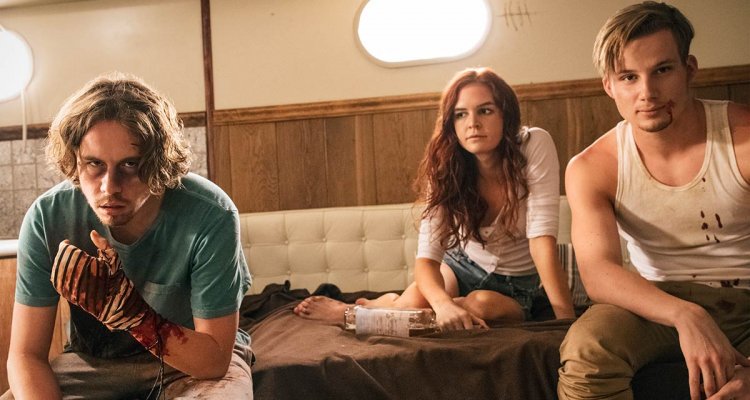Commonly confused with similar aquatic armory, harpoons don’t actually feature in this film. The title “Harpoon” is instead taken from a character’s inability to discriminate one from a spear gun. How the others mock! But the weapon is, of course, metonymic, the lurking symbol of escalation, of violence, of perceived threat. Like Chekhov’s Gun, it has to go off.
Director Canadian Rob Grant calls on the depths of oceanic literature to produce a nasty, infrequently comic tale of desperation, madness, and delusion. The boat is an exceptional space: anxiety is heightened, deception emphasized, guilt refracted. Irrelevant to crime or reality, suspicion will damn all, producing a whirlpool of attacks and counterattacks, dragging sailors deep into the abyss. Here, the amateur sailors consist of an insufferable trio: blonde, blue-eyed, numpty rich kid Richard Parker (Christopher Gray); his waspish, apparently superficial girlfriend Sasha (Emily Tyra); and nerdy, watch-out-for-him best friend Jonah (Munro Chambers). All are out for a day trip; all are odious in their own way; all encourage comeuppance. Their bickering is down to the first scene’s revelation: did you fuck each other? For us, this amounts to: who cares?
Adrift at sea, Richard, Sasha, and Jonah are left without outside contact or supplies, only able to construct an environment of claustrophobia and simmering insanity. Above deck or below, this won’t end well. Jonah cites the original tale of Richard Parker’s misfortune and journey towards human dinner, tracing it through the same-named character in Edgar Allan Poe’s “The Narrative of Arthur Gordon Pym of Nantucket,” and onto Yann Martel’s again-same-named tiger in “Life of Pi.” This ‘coincidence’ is toyed with ominously. No matter the characters’ arch, supposedly millennial self-awareness, the truth of nominative determinism and nihilistic sociopathy will conquer. These self-conscious literary references arrive and dissipate, awkwardly introduced and cast away. “Moby-Dick” is bafflingly omitted: Captain Ahab’s demise through the harpoon-line is perhaps too pointed, even here.
Pompously divided into chapters, “Harpoon” has a just-discernible formal and thematic structure in response to its historical lineage. Like their literary predecessors, characters drink turtledove blood, isolate the weaker crewmates, alternately establish and lose moral authority. Grant, who contributed the screenplay, delivers these fluctuations in treacle, resulting in an exhaustingly overwritten film. Barbs of dialogue are so sluggish as to cause suffocation through exposition. The tentatively ‘postmodern’ adaptation of Ron Howard’s “Arrested Development” voiceover infuriates at intervals, blathering context and needless dramatic irony. Commentary on toxic masculinity is muted but noticeable: the two men — representatives of geek and jock — are undoubtedly the agents of pain and turmoil. Sasha’s gradual ruination, while generally a cursory depiction, is preserved through prominent purple neck bruises. This has political effect. Less refined is the thesis that Richard’s violent, dominating tendencies stem solely from financial power.
Slapstick aggression and friendly japes are interwoven with graphic bouts of savagery. Skepticism and distrust morph quickly into brutality, gore, and threats of cannibalism. Cartoon violence is delivered with po-faced certitude, in what is intended as a dark comedy of reparations. Tonal descent into creeping darkness is the clever route, but the humor that cuts through is smug and self-satisfied. Blunt and irreverent repartee is one thing, boorish babble another. To produce hateful characters is a success, to produce bland and bleating archetypes not. The thriller element keeps things ticking, but the sort of ticking that elicits tinnitus and desire for hearing loss. One decent scene recalls George Saunders’s story “Adams,” in which a pre-emptive strike fans the flames of conflict. In “Harpoon,” Richard demands the others merely throw all possible weapons, or anything that could be made into such, off the boat. Escalation thrives from a perceived threat.
A lot of weight is placed on daddy’s yacht, as if the setting itself provides intrigue and gripping machinations. Rendered successfully, the ship can act as heterotopia: self-enclosed, out in the endless open water, a distorted mirror and microcosm of our daily isolations, antagonisms, and primal desires. Cinematically, such a space requires competent direction, thoughtful choreography, sensitivity to light and angles, and belief in actors to convey oscillating feeling. This film has Richard, Sasha, and Jonah in a pitched battle of tortuous needling and braying one-upmanship, held within a monotonous framing. Foucault wrote that, ‘In civilizations without boats, dreams dry up.’ “Harpoon” centers on a boat but leaves us emotionally, intellectually, aesthetically parched. If only it were funny. [D+]

